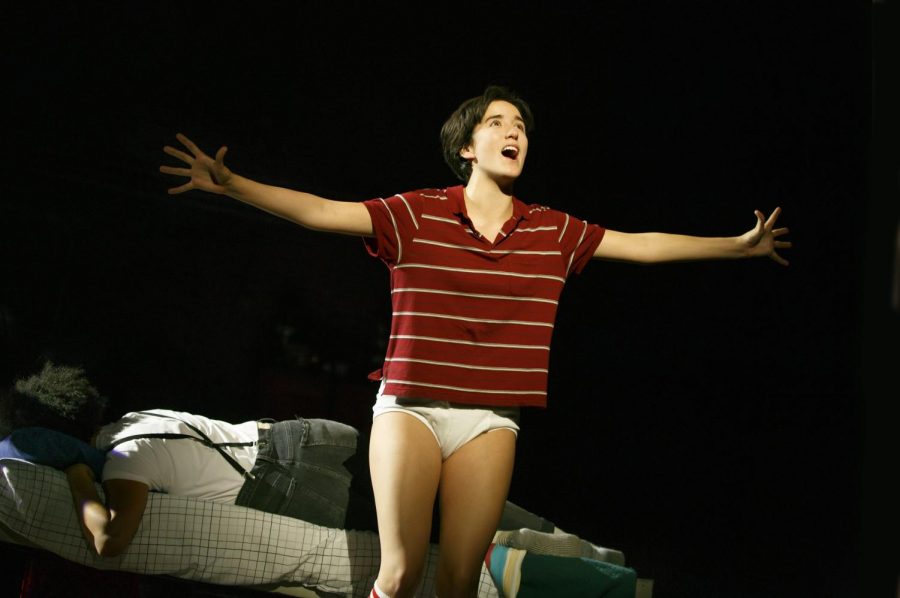‘Fun Home’ aims to inspire self-love for all generations
“Fun Home” is the nickname for Alison Bechdel’s family funeral business as well as the title of her 2006 graphic memoir and its musical adaption, which will premiere in Chicago at the Oriental Theater, 24 W. Randolph St., on Nov. 2.
October 31, 2016
Despite their initial wariness of the award-winning Broadway musical “Fun Home,” critics and audiences alike have embraced “small,” “medium” and adult Alison Bechdel as she learns to accept her sexuality and dysfunctional family through these three stages of her life.
Based on Bechdel’s 2006 graphic novel memoir of the same name, the show, which won several Tony awards in 2015 for its Broadway production including “Best Musical” and “Best Original Score,” will run at the Oriental Theater, 24 W. Randolph St., Nov. 2–13 as part of its national tour that began Oct. 2.
Themes of family, sexuality and challenging gender roles are woven throughout the musical as “small” Alison rejects her father’s obsessive demands by refusing to grow out her hair or wear skirts. In both the memoir and the play, a 43-year-old Bechdel takes time to reflect on her life.
“I knew I wanted to be in [‘Fun Home’] right after I saw it,” said Abby Corrigan, who plays “medium” Alison. “I said, ‘This is important right now, I have to be a part of it.’”
It is not until she is 19 years old that she comes out to her family. Shortly after, Bechdel discovers her father is closeted and contemplates their relationship in a new light.
Libraries initially criticized the memoir for its explicit “pornographic” material because of Bechdel’s father’s affairs with underage boys and her own sex life with her girlfriend Joan during college.
“We’re definitely pushing the envelope [and] testing our value system,” said Robi Hager, who plays several characters in the show including Pete and Bobby Jeremy. “It is neat to see the reception we are getting. It gives us a lot of hope with this tour.”
The tour is announced through August 2017 and features music by Jeanine Tesori and lyrics by Lisa Kron
“The message of [‘Fun Home’] is how amazing and freeing it can be when you are able to accept yourself and how deprecating it is when you cannot,” Corrigan said.
Bechdel is one of the few lesbian protagonists on Broadway, an important issue for Corrigan, especially when performing Bechdel’s coming-out scene.
“The power of saying [‘I’m a lesbian’] even if people are uncomfortable with it—it is what needs to happen right now,” Corrigan said. “We need to make America uncomfortable again.”
Hager said Bechdel’s story sparked a dialogue as all generations reevaluate their belief systems after seeing the show.
“The more frequently diverse groups can be portrayed in the media and be seen, the more people can understand [them],” said Garnett Kilberg-Cohen, professor in the Creative Writing Department.
Hager added that the dialogue created by the show promotes a mutual understanding of where shows like “Fun Home” will be in the future.
“Coming out as a gay man, it is relatable when ‘medium’ Alison comes out to her parents,” Hager said. “We all go through that [powerful emotion of] ‘I have regained who I am again.’”
Since starting the tour, Corrigan said audience members her age have expressed appreciation for her portrayal of a young lesbian freeing herself from society’s gender norms.
“You can see that they have confidence they may not have had without having seen the show,” Corrigan said.
The show represents the harsh realities of Bechdel’s life, but Corrigan said she believes pushing these themes into the fast lane is necessary for society’s growth.
“Getting out of your comfort zone is something that everyone needs,” Corrigan said. “Experiencing as many things as you can, can make anyone a better person.”








